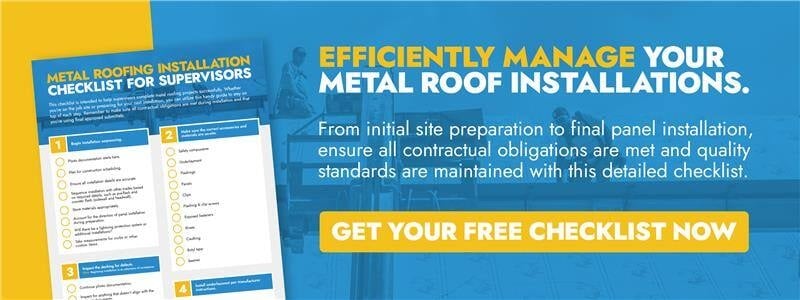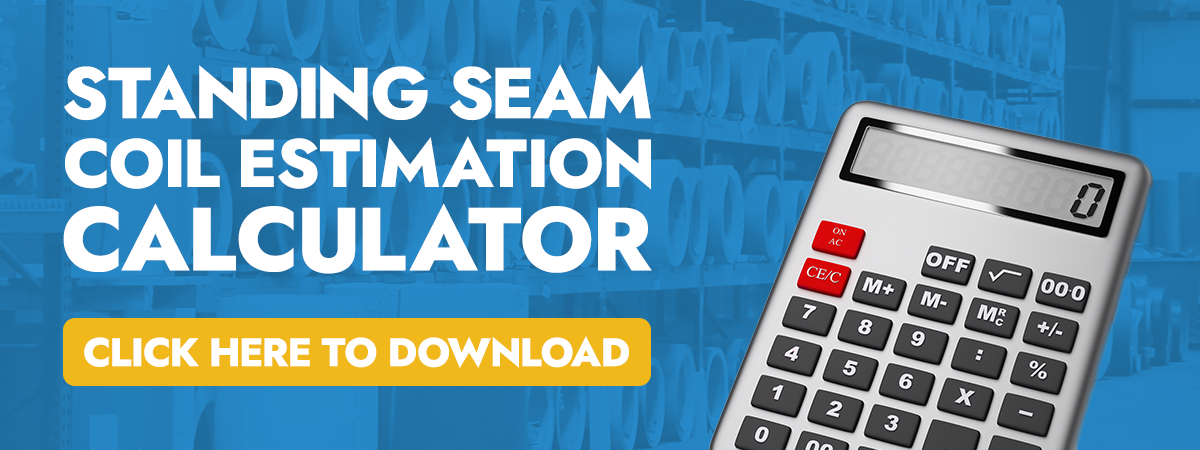Metal Roofing Contractors: Avoid These 7 Common Mistakes to Protect Your Bid
Learn the 7 biggest mistakes metal roofing contractors make during the bidding process—and how to avoid losing money, time, and credibility.
You win the bid, the contract is signed. But then the steel market skyrockets, and a once profitable job is at risk of losing 30-40% of its margins. This is a real and all-too common situation for metal roofing contractors, especially in times when material prices are volatile.
Without the proper safeguards, a profitable job can quicky turn into a financial setback. So how do you defend against rising material prices when you’re working on a job, and what can you do to protect your bid?
The best way to know how to protect your bid is to understand what not to do — that’s why we’ve put together seven of the most common mistakes we see metal roofing contractors make.
By the time you’re done reading, you’ll have actionable strategies to avoid profit erosion, protect your reputation, and steer clear of common pitfalls when you’re bidding a metal roofing project.
Mistake #1: Failing to Include Escalation Clauses in Contracts

“Make sure there’s a very straightforward one or two sentence escalation clause to protect your bid.”
–Adam Mazzella, President of Sheffield Metals and New Tech Machinery
Winning and locking in a project is great, but at the end of the day, you want to make sure you can make money off of it. Far too often metal roofing contractors lock in a project price without putting in escalation clauses, and then material costs shoot up. These contractors are left paying for price jumps out of their own pocket because they didn’t put the correct statements in their contract. Their profit margins are suddenly slashed.
Solution: Put clear escalation language into every contract. Escalation clauses or contingencies are statements in a contract that let the customer know that contractors have the right to adjust final pricing should material costs rise. These clauses should be stated clearly and concisely. It could be something as simple as one sentence:
“Should material costs increase between the date of contract signing and project execution, the increase will be passed along to the end user.”
Even handwritten contracts with this language can be enforceable. Just make sure that you include escalation statements and clearly communicate what it means to the home or building owner.
Mistake #2: Not Locking in Colors, Profiles, or Specs Early
The vision a homeowner has for their roof can be fluid. Buyers change their minds, and for them, changing to a different color or profile after the contract has been signed might not be a big deal, but it can come with huge headaches for the contractor. Suppliers only carry a certain amount of inventory at a time, and switching from a standard to premium finish or to a different color can come with additional charges.
Solution: Lock in colors, profiles, and the specs of your project early, with signed approvals and selections from your customer. This way, the details of your project will be set, and you won’t have to worry about getting different materials and dealing with upcharges or restocking fees after the project has started. Be sure to lock in the details so you can get the materials you need ahead of time and be confident in what the project will entail.

Mistake #3: Poor Communication with Clients About Market Fluctuations
“Most deals are struck because of trust. Part of building that trust is talking through what could go wrong — including pricing risks.” – Adam Mazzella
Being vague in contracts and communicating poorly hurts all parties involved — it hurts the homeowner because they lose faith in a contractor’s motives, and it hurts the contractor because that vague language can come back to create delays or added charges later in the project. And the more uncertainty there is in the economy, the more hesitant and wary customers will be.
Solution: Act as the customer’s guiding force. Being up front and clear will help gain their trust. Go over their contract with them and make sure to answer any questions they have as best as you can. Explain how escalation clauses work, why they’re in the contract, and share supplier increase letters or news about trends in the market to display transparency.
Buyers are more educated than ever, so they’re already knowledgeable about the industry and watching for red flags. For customers, making purchases is all about trust, and explaining price risks up front helps develop that trust.
Mistake #4: Not Establishing a Strong, Communicative Supplier Relationship

Communication is important not just between contractors and customers but also with your metal roofing supplier. If you don’t have a direct line to your supplier and you’re not communicating about current and upcoming projects or bids, it can leave you in the dark when it comes to price increases or inventory shortages.
Solution: Keep your supplier in the loop on upcoming projects. If you have a large job coming up, make sure to tell them about it early. This lets your supplier prepare inventory and even possibly offer discounted bulk pricing. When market fluctuations happen, suppliers can let you know how pricing will be affected in advance.
Mistake #5: Pre-Purchasing Without Commitments
“If it’s not locked in, don’t buy it.”
– Adam Mazzella
Buying materials without signed and documented commitments is a gamble, and one that has a good chance of not paying off. While it might seem like a good idea to buy early when material prices are low, buying before you have a signed agreement introduces all kinds of risk into your business.
Your customers might change their minds and want a new color or profile after consulting with a designer. You could get stuck with non-returnable inventory, face steep restocking fees and inventory delays, and end up with a substantially lower profit margin for your project.
Solution: Only buy materials if you have signed approvals and written confirmation of the color and profile selections. Otherwise, wait until everything is finalized. Buying early when you don’t have assurances only leads to bigger losses than any potential savings.

Mistake #6: Overlooking the Importance of Precise Contract Language
Vague contract language leads to cascading issues — confusion for the customer, erosion of trust, and problems that can escalate over the course of the project, ending in pricing disputes and delays. Vague contracts can leave the project open to timeline shifts or scope changes. All of these can make a dent in your profit margin.
Solution: Be as specific as possible in your contracts. Spell out project start dates, escalation clauses and contingencies, performance windows, and price adjustment processes. Concrete, precise language is the key to protecting your bid and eliminating uncertainty for both you and your customer.
Mistake #7: Ignoring the Technical Side of Panel Selection

Choosing the wrong panel for a job can severely extend timelines and balloon costs. Contractors that install panels knowing they might not be the best fit for the job can damage their own reputation when the installation ends up with serious problems.
Different panel profiles may require different coil widths to form the panels. Changing panel profiles can increase the amount of coil needed to install the same job, which can dramatically impact the cost of the project. Make sure you’re quoting the panel that’s right for the unique roof conditions of the project.
Solution: Take time to consider the technical aspects of your project and all of the unique factors involved. Consult with your metal roofing supplier’s technical team and use take-off software and profile selection tools to find the right fit. And be sure to communicate all of this with your customers so they understand why you’re using those specific materials and products.
Get Help With Your Bid From Sheffield Metals
Winning a bid is a success in itself, but it’s just as big of a win to lock in products and materials with signed agreements and concrete contract language. To avoid common pitfalls with protecting your bid, be sure you’re communicating clearly with both your customer and your metal roofing supplier; that way, pricing fluctuations can be transferred easily from one party to another.
Looking for support to protect your bid? Sheffield Metals International (SMI) has a comprehensive Commercial, Architectural, and Technical (CAT) team ready to assist with every aspect of your project, from initial designs to finished installation.
Partnering with Sheffield Metals means constant and clear communication, especially when it comes to pricing fluctuations and market conditions. We’re happy to provide our customers with information about the industry and be as transparent as possible. Contact us today to start a partnership.





